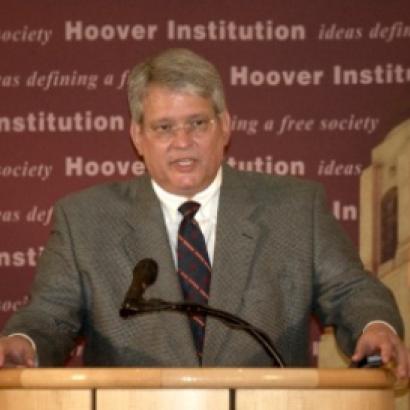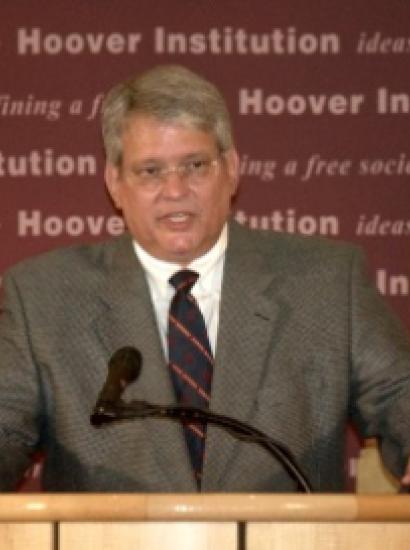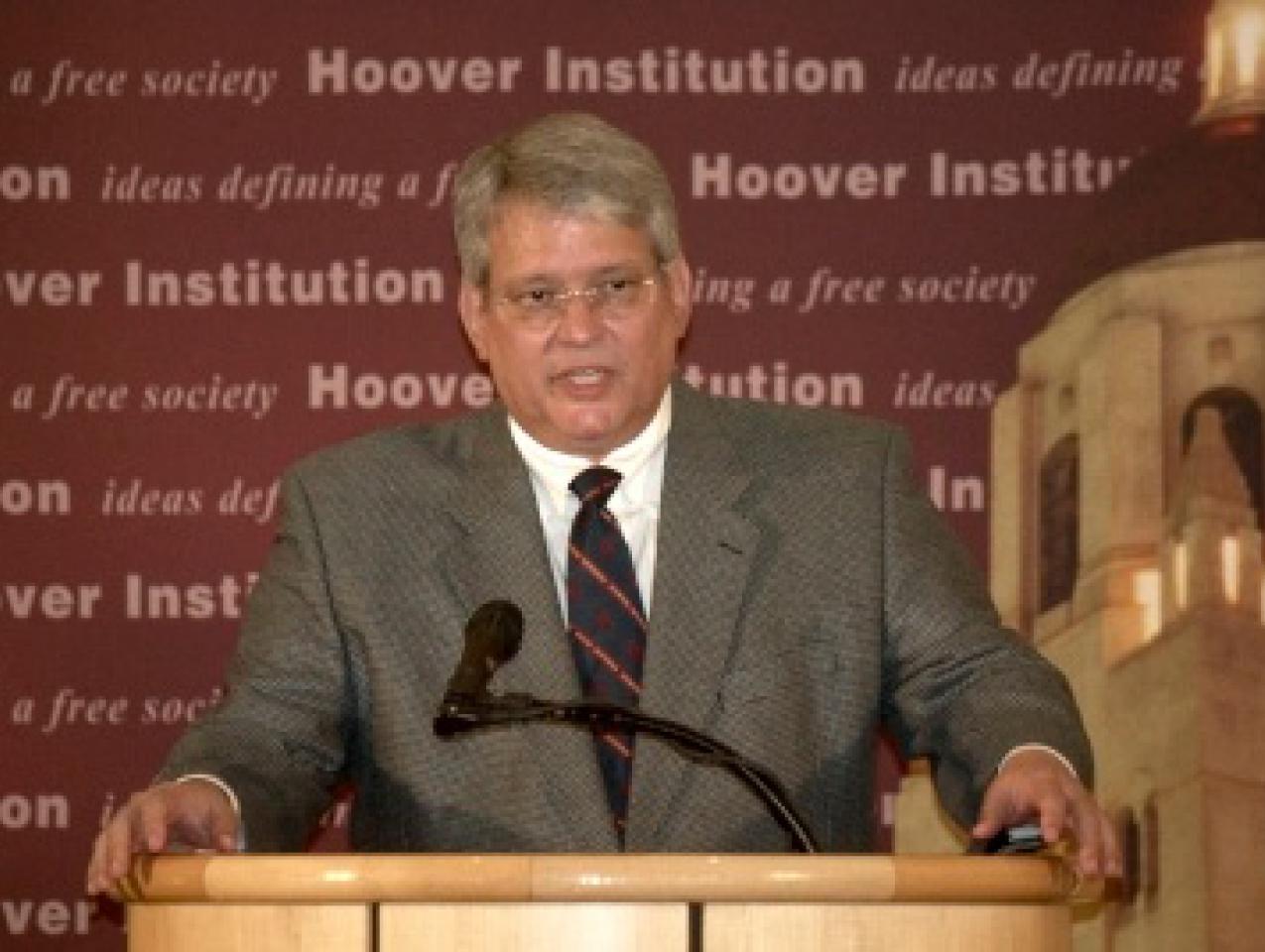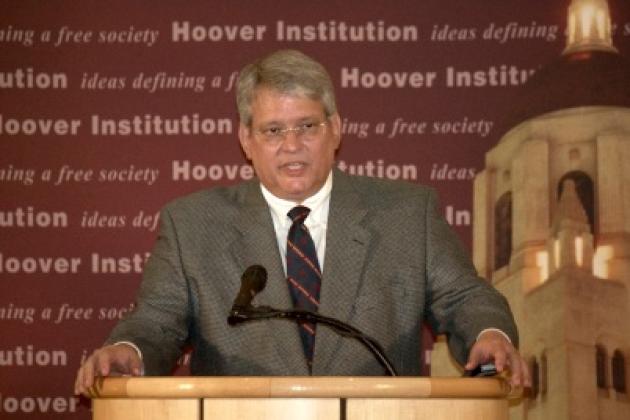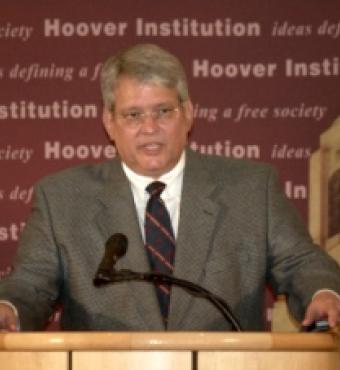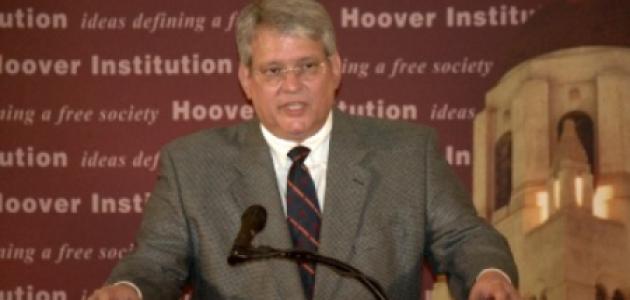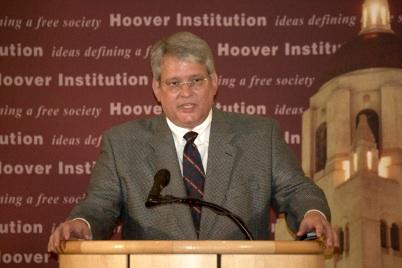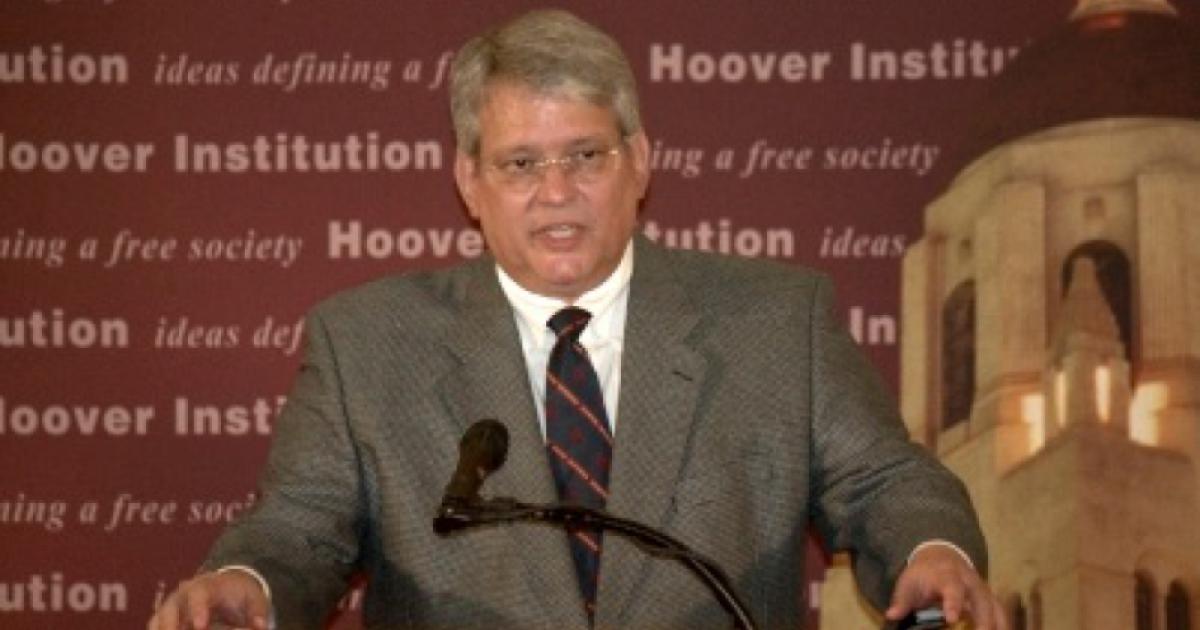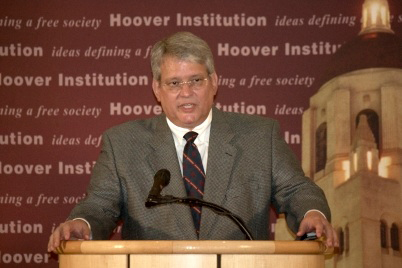
The Hoover Institution’s 2010 Spring Retreat began on Sunday, April 25, with before-dinner remarks by veteran TV writer and producer Rob Long, a contributing editor for the National Review and Newsweek International.
Long discussed changes in how people interact with media: it’s no longer “you sit, you watch” but “you sit, you connect” he said in his remarks titled “New Media, New Politics, New Opportunity: What the Death of Hollywood Means for All of Us.” Long also noted a correlation between the current state of politics and changing media viewing habits, observing that “our politics reflects the disruption of media.”
At dinner on April 26, author, critic, and syndicated columnist Mark Steyn said in his talk, “Outsourcing the Future,” that today’s accumulated national debt would be passed on to future generations. America, he believes, is in a transition phase, with its leaders putting America on course for “European-size government without European taxes.”
John Raisian, the Tad and Dianne Taube Director of the Hoover Institution, delivered welcoming remarks before Monday’s sessions.
Presentations by Hoover scholars were on a variety of topics, including civil rights and civil liberties, war, the November election, health and economic reform, Islamism, California government, and the relationship between the Hoover Institution and Poland.
John Raisian, the Tad and Dianne Taube Director of the Hoover Institution, made welcoming remarks before Monday’s sessions, which featured presentations by Hoover scholars on a variety of topics, including civil rights and civil liberties, war, the November election, and health reform.
Hoover senior fellow Michael McConnell, who is arguing for the Christian Legal Society in the case Christian Legal Society v. Martinez before the Supreme Court, discussed the issues of discrimination and public subsidies at the center of the case in his talk “The Coming Clash between Civil Rights and Civil Liberties.” McConnell, a professor of law at the Stanford Law School, also directs the Stanford Constitutional Law Center.
In “The Road to the 2010 Elections,” David Brady, the Davies Family Senior Fellow and deputy director at Hoover, and Morris Fiorina, Hoover senior fellow, assessed the possible outcomes of the November election. Fiorina concluded that 2010 could be another 1994. In his remarks, Brady said that “historical averages tell you it’s a good year for Republicans.” Although the opposing party often regains seats in off-year elections, Brady argued that voters’ increasing frustration and anger with government would play a role in the the upcoming election.
War was the topic of Victor Davis Hanson, the Martin and Illie Anderson Senior Fellow at the Hoover Institution. In his talk titled “Wishing War Away?” Hanson examined the causes, military strategy, and outcomes of historical and contemporary war. He reminded the audience to study military history, as no society can endure without reverence for the past, and that contemporary conflict can be understood by examining the past.
Mark Pauly, a member of the Hoover Institution’s Working Group on Health Care Policy and a professor at the Wharton School of the University of Pennsylvania, believes that, despite the passage of a health care bill in Congress, there is much left to discuss. In his talk, “Health Reform: Just the End of the Beginning,” Pauly noted that there are plenty of loose ends in the legislation, that the whisper-thin majority suggests both instability and flexibility, and that it’s possible to turn implementation in a positive direction. Pauly’s most recent book is Health Reform without Side Effects: Making Markets Work for Individual Health Insurance (Hoover Press, 2010).
Hoover’s National Security Affairs Fellows for 2009-10 were part of a panel discussion, “The Future of the American Military,” moderated by Hoover senior fellow Thomas Henriksen, who is also a senior fellow at the U.S. Joint Special Operations University. Panelists included Lieutenant Colonel Dave Almand, U.S. Air Force; Lieutenant Colonel Don Chipman, U.S. Marine Corps; Lieutenant Colonel Sam Grable, U.S. Air Force; Commander Scott Hielen, U.S. Navy; Anastasia Nichols, U.S. Department of State; and Colonel Dino Pick, U.S. Army.
The National Security Affairs Fellows Program offers representatives of the U.S. military and government agencies the opportunity to conduct independent research on topics relevant to their respective branches of government and to the practice of diplomacy. Admission to the program is based on direct nominations from each governmental branch. Since the program began in 1969, more than 125 people have participated.
The financial reform bill proposed by Senate Banking Committee chairman Chris Dodd was discussed by John Taylor, the George P. Shultz Senior Fellow in Economics at the Hoover Institution and chair of the Hoover Institution’s Working Group on Economic Policy. After noting the many drawbacks of the Dodd bill, Taylor recommended that it’s “much better to reform bankruptcy law for financial institutions.” In his presentation, “Ending Government Bailouts as We Know Them,” Taylor cited a Hoover Press book he coedited by the same title in which a proposal for a Chapter 11F is outlined.
In their presentation, titled “The Long War: Radical Islamism, Europe, and American Power,” Hoover senior fellows Fouad Ajami and Russell Berman discussed the need to understand Islamists, a primary goal of the Hoover Institution’s Working Group on Islamism and the International Order of which both are members and which Ajami cochairs.
Ajami, who is also the Majid Khadurri Professor of Middle East Studies at Johns Hopkins University, provided an overview of the worldwide Muslim population, which is often thought to reside mainly in the Middle East. Strikingly, however, only 20 percent of Muslims live in the Middle East and North Africa; nearly 62 percent live in the Asia-Pacific region of the world, and the remaining Muslims live in sub-Saharan Africa, Europe, and the Americas. In addition, Berman, the Walter A. Haas Professor in the Humanities at Stanford University, pointed out that, in this struggle, we Americans need to learn more about ourselves and our European allies.
Closer to home, California was the subject of a panel discussion titled “What’s Wrong with California: Can It Be Fixed?” Panelists included Thad Kousser, the Glenn Campbell and Rita Ricardo-Campbell National Fellow, 2009–10; Henry Rowen, a senior fellow at the Hoover Institution and a professor of public policy and management emeritus at Stanford University; and Bill Whalen, a Hoover research fellow. The moderator for the discussion was Hoover deputy director David Brady.
The plane crash that killed Polish president Lech Kaczynski and other national leaders prompted a recollection of Hoover’s long history with Poland, “Amicus Poloniae,” by Richard Sousa, director of the Hoover Library and Archives. From its beginning, Sousa said, the Hoover Institution has enjoyed a close relationship with Polish leaders, including holding the papers for the Polish government in exile after the Nazi and Soviet invasion of Poland in September 1939 and developing a Diplomat Training Program for Polish leaders between 1990 and 1995. After the collapse of the Soviet Union, Hoover opened a library and archival acquisitions office in Warsaw. President Kaczynski awarded several high Polish state decorations to scholars at Hoover, including Hoover fellow and former secretary of state George Shultz, Hoover fellow Robert Conquest , and Director John Raisian.
In addition to the plenary speakers, the following Hoover scholars were presenters at the retreat:
Peter Berkowitz, the Tad and Dianne Taube Senior Fellow and an expert on classical and contemporary liberalism, American constitutionalism, and the Middle East, gave a presentation titled “Israel, Iran, and the Obama Administration.”
Kenneth Jowitt, the Pres and Maurine Hotchkis Senior Fellow at the Hoover Institution and the Robson Professor of Political Science Emeritus at the University of California, Berkeley, discussed “America: Liberty or Equality?”
“Technology, Politics, and the Future of American Education” was the title of a presentation by Terry Moe, a senior fellow at the Hoover Institution and the William Bennett Munro Professor of Political Science at Stanford.
Terry Anderson, the John and Jean De Nault Senior Fellow at Hoover and executive director of the Property and Environment Research Center, a think tank in Bozeman, Montana, that focuses on market solutions to environmental problems, discussed “Why I’m a Rational Optimist: Hint—Property Rights and Markets”
David Davenport, a Hoover research fellow who also serves as counselor to the director of the Hoover Institution, addressed domestic issues in his presentation “Are Federal Education and Health Care Reforms Unconstitutional?”
Hoover research fellow Paul Gregory, author of Lenin’s Brain, discussed his just-released book Politics, Murder, and Love in Stalin’s Kremlin (Hoover Press, 2010). Gregory holds an endowed professorship in the Department of Economics at the University of Houston, Texas, and is a research professor at the German Institute for Economic Research in Berlin.







